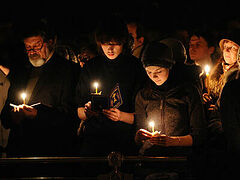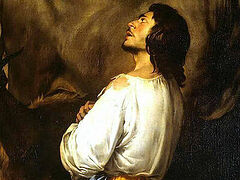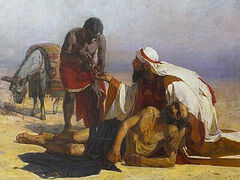In the name of the Father, and of the Son, and of the Holy Spirit!
Today’s feast is, one might say, a feast that is laden with sorrow—as we commemorate Christ’s triumphal entry into Jerusalem, we are at the same time reminded of His sufferings that are to follow in the coming days. Yes, even the Lord Himself, when He came down from the Mount of Olives and saw Jerusalem before Him, wept over it and said: Oh, If thou hadst known, even thou, at least in this thy day, the things which belong unto thy peace! But now they are hid from thine eyes. For the days shall come upon thee, that thine enemies… shall not leave in thee one stone upon another; because thou knewest not the time of thy visitation (Luke 19:42-44).
When you read the Gospels, you are struck by the extent to which the Pharisees and scribes did not recognize Christ, how callous their hearts were when, seeing His obvious miracles, they thought He was possessed, and when, after learning about the miraculous raising of Lazarus, not only did they not believe in Him, but also wanted to kill Lazarus. And yet these were people who knew the law of God ideally, who knew the Scriptures perfectly and, at least formally, fulfilled everything that was written therein.
How did it happen then that these people, while constantly trying to serve God, did not recognize God, who had come into this world, and ended up killing Him? This is a very important subject, because we all run the risk of ending up in a similar position, fulfilling every external obligation and living an absolutely “correct” Christian life outwardly, yet leaving our souls empty. Examples of this, unfortunately, have been seen throughout the history of the Church and in modern times as well.
Recently I came across a satirical work from the seventeenth century bearing the appalling title, “The Service of the Pub”, in which drunkenness is glorified in the form of a liturgical text. Clearly, this illustrates the degree of moral degradation these people had reached—such that they were even capable of mocking the divine services of the Church. But here is what is striking: In this “service”, from a liturgical point of view, everything is perfect: the number of verses, their arrangement, their theme—everything is as it should be in a liturgical text. What this means is that the person knew the divine services perfectly, but used this knowledge not to glorify God, but to mock what was sacred. And this is not something uncommon.
 How many people were there who left the Church during the persecutions that occurred in the twentieth century! Among them were priests who seemed to be ardent preachers, zealous clergymen, but as soon as the persecutions came, they either left immediately to join the “Renovationists”, or abandoned their ministry altogether. And how often in our time it happens that a person may outwardly fulfill everything necessary, but at heart not be a Christian? This is a danger that threatens us all.
How many people were there who left the Church during the persecutions that occurred in the twentieth century! Among them were priests who seemed to be ardent preachers, zealous clergymen, but as soon as the persecutions came, they either left immediately to join the “Renovationists”, or abandoned their ministry altogether. And how often in our time it happens that a person may outwardly fulfill everything necessary, but at heart not be a Christian? This is a danger that threatens us all.
So what can we do in order to prevent this from happening? There is one answer: It is crucial to keep our Christian life “alive”, so to speak, and it is very important to make sure that all of the church rules we follow do not become a formality for us. Of course, we are supposed to fulfill everything that the Church prescribes for us, but we must do so wholeheartedly. For example, we all know that a Christian must read the Gospel daily, and I think we all try to do that. But we can read the Gospel in a number of different ways—we can do it simply to cross it off our list as done, or we can read it, as St. Ignatius says, with all our heart and mind; that is, as we read the Gospel, we can actively take note of what commandments the Lord gives us, what the Lord expects from us, and what He wants us to do.
During the service, when we hear the liturgical texts and hymns, we have to allow them to penetrate our hearts so that they might not just be a pleasant background noise, but so that every word uttered by the priest, deacon, and choir may become our own personal prayer, so that we may understand each word, let it pass through our heart, and pray together with the Church. And the same principle applies to all of the rules prescribed by the Church.
It is also very important to always examine ourselves, to constantly analyze our lives: are we keeping God’s commandments? Are we trying to get closer to God? Are we repenting of our sins?
The holy fathers advise us to examine ourselves every evening: to recall what good things we have done by the grace of God, and in what we have sinned; and to repent before God and ask for His help for the coming day. If we strive to do this, our Christian life will never become formal, and we will avoid that terrible danger that the scribes and Pharisees of Jerusalem 2,000 years earlier had failed to avoid. When one falls into such formalism and begins to fulfill only what is external, his soul gradually “burns out”, as it were, rendering him unfit for the service of God.
May this not happen to us. And as we now behold Christ entering Jerusalem, let us make an effort to be more like Him and not like those who, in a few days from now, will carry out His Crucifixion. Let us follow after Him and strive to live a genuine spiritual life, and He will lead us into the Kingdom of Heaven. Amen.








